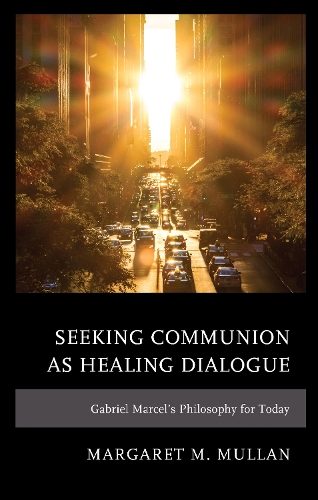
Seeking Communion as Healing Dialogue: Gabriel Marcels Philosophy for Today
(Hardback)
Publishing Details
Seeking Communion as Healing Dialogue: Gabriel Marcels Philosophy for Today
By (Author) Margaret M. Mullan
Bloomsbury Publishing PLC
Lexington Books
10th June 2021
United States
Classifications
Professional and Scholarly
Non Fiction
Impact of science and technology on society
Philosophy
153.6
Winner of Single-Authored Book of the Year 2021
Physical Properties
Hardback
178
Width 161mm, Height 228mm, Spine 19mm
454g
Description
Seeking Communion as Healing Dialogue: Gabriel Marcels Philosophy for Today discusses societys problems with interpersonal communication, arguing that these issues are more deeply rooted in problems in being. Margaret M. Mullan draws on the work of Gabriel Marcel to explore the meaning of body, of being with, and of being at all in todays world, answering questions about why we are often unable to dialogue with the people around us, why we feel disconnected and alone even in an increasingly technological world, and how these changing technologies expose and sometimes exacerbate our weak connections to others. Engaging Marcels reflective method and theory of communion, Mullan explores how we seek communion amid technology and proposes that Marcels reflections are generative contributions to the understanding and study of communication, offering a way to seek healing dialogue in present day. Scholars of communication, philosophy, conflict studies, and media studies will find this book particularly useful.
Reviews
Margaret Mullan brilliantly mines Gabriel Marcel's existential reflections on communication and then builds them into a lucid and inspiring theory of dialogue. Prompted by the many barriers to communication rife in our technologically framed world that undermine our ability to address others in who they are, she develops strategies to awaken us to forms of healing intersubjective dialogue. Her careful research thus reveals profoundly the rich contribution of Marcel's thought for an incisive contemporary philosophy of communication.
--James Swindal, Duquesne UniversityMargaret Mullan offers a lucid and creative assessment and application of Gabriel Marcel's philosophy, with its all-important existential analysis of "the broken world" as a category of human experience. This book is a valuable addition to the growing scholarly literature in communication ethics.
--Michael J. Hyde, Wake Forest UniversityMargaret Mullan walks with the reader in our brokenness, in our canyons of divide. She brings Gabriel Marcel into our experience, reminding us of the embodied importance of the communion of co-presence. This book is a must-read for those who recognize that this historical moment calls forth our communal engagement with one another, transforming our communicative disappointments into the possibility of joy and relational meaning.
--Ronald C. Arnett, Duquesne UniversityOur 'seismically broken' world cries out for healing and hope. Margaret M. Mullan gifts us with a vision for a new way of interacting in this 21st-century, communication-saturated world: through communion. Those who care about social justice, poverty, education, democracy, race relations, or gender disparities should read this jewel of a book, which brings existentialism to bear on the contemporary moral issues of the day...and gives a glimpse of a hopeful future.
--Jill Graper Hernandez, Central Washington UniversityThis is as it should be: in a dialogic encounter with a profound thinker of the past, our present ways of being in a broken world are opened to the chance of being made better. Seeking Communication as Healing Dialogue allows us to see how-in our wayfaring together-we might disclose the sacred, which although ever-attending, has been covered over by our too-poor manner of being with one another. Mullan gives us an interpretation of Marcel's philosophy, the virtue of which is helping orient our communicative practices toward healing self and other in our technological age.
--Ramsey Eric Ramsey, Author of "Leaving Us to Wonder: An Essay on the Questions Science Can't Ask," Arizona State UniversityAuthor Bio
Margaret M. Mullan is assistant professor at East Stroudsburg University of Pennsylvania.
